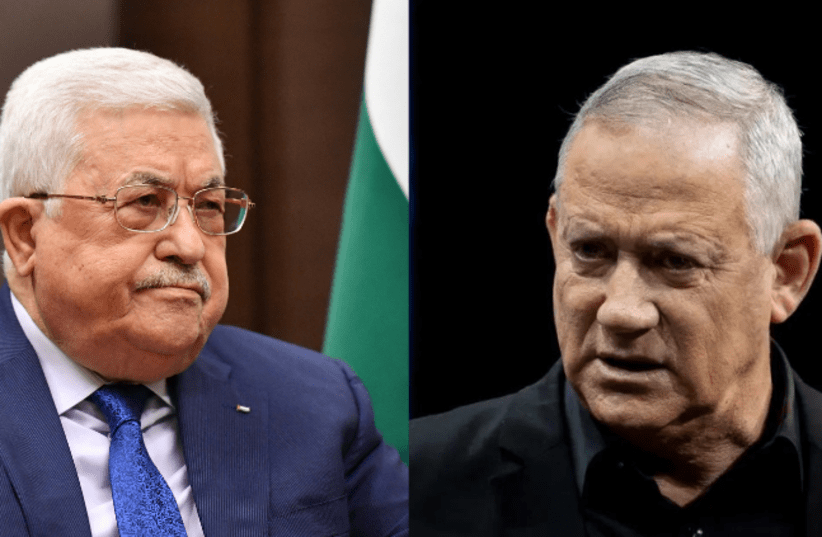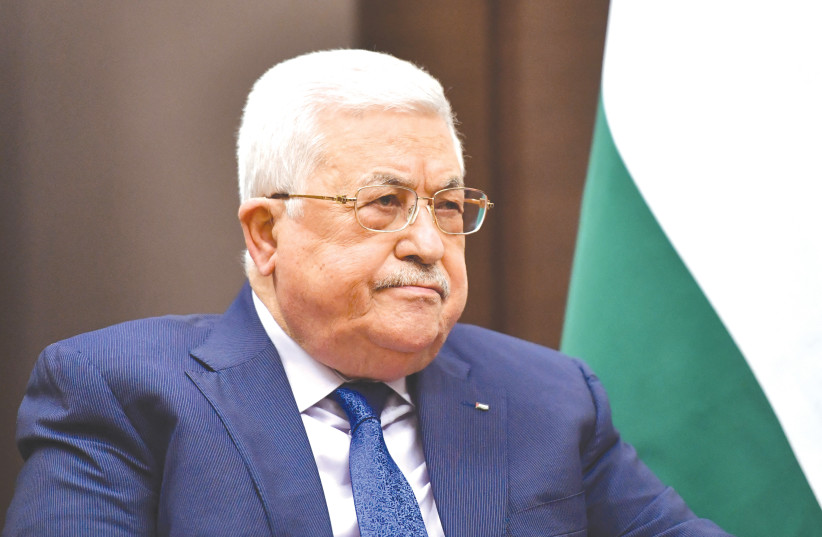On Tuesday evening, Defense Minister Benny Gantz hosted Palestinian Authority President Mahmoud Abbas (Abu Mazen) in his Rosh Ha’ayin home for a meeting for which he was sharply criticized by the Right, including the Right within his own government.
The criticism ranged from anger that Gantz would host a man who pays stipends to terrorists in Israeli jails and their families, to fury that he was “resuscitating Oslo” and making Abbas relevant at a time when much of the world was finally realizing that Abbas and the PA are impotent.
Gantz’s response was to tweet a line that sounded a lot like Yitzhak Rabin during the Oslo period: “Only one who has responsibility for sending soldiers into battle knows how deep the responsibility to prevent that is.”
Following the meeting, Gantz announced several confidence-building measures. These included a NIS 100 million advance on tax payments Israel collects for the PA, legalizing the status of 9,500 undocumented Palestinians and foreigners in the West Bank and Gaza and granting 1,100 business passes to senior businesspeople.
The ostensible goal was to signal to the Palestinians that Israel was interested in putting the relations on a better footing – a reasonable goal considering the rise of tension both in Judea and Samaria and from the Gaza Strip.
But any hope that the Palestinian Authority would reciprocate to these goodwill measures with some goodwill measures of its own – perhaps toning down the strident anti-Israel rhetoric that spews endlessly from PA officials – was dashed Friday when Abbas gave an address to mark the 57th anniversary of Fatah’s first attack on Israel.
That attack, by the way, came on January 1, 1965, when terrorists attempted to bomb the National Water Carrier. The date is significant because it came almost two-and-a-half years before the Six Day War, when Israel gained control of Judea, Samaria, east Jerusalem, Gaza, the Sinai and the Golan Heights.
If current Palestinian violence, as the world is often told, is “just” to get Israel to withdraw to pre-1967 lines, why was Fatah bombing the National Water Carrier before that? And why is that a cause for anniversary celebrations?
What is at issue here, however, is not the reason for Abbas’s speech, but that his first public words after meeting Gantz during that speech were anything but conciliatory. On the contrary, he accused Israel of carrying out “hideous policies of ethnic cleansing and organized terrorism” against Palestinians.
“The anniversary of the launch of our revolution comes in extremely critical and difficult circumstances due to the continuation of the abhorrent Israeli occupation, the escalation of its repressive practices and persecution against our people, the theft of our land and natural resources, the stifling of our economy, the withholding of our tax funds and racial discrimination,” he said.
If that’s how Abbas spoke after meeting Gantz for a couple of hours and receiving a few confidence-building measures, one wonders what he would have said had they not met.
The answer is: the speech would have been no different.
And that’s the problem – the meeting and the subsequent Israeli gestures had no impact whatsoever on Abbas’s rhetoric. This fact gives those Israeli critics of the meeting – and Israelis critical of confidence-building measures to Abbas – reason to ask: if nothing helps modify Abbas’s tone, then why make gestures?
Granted, there is a context to Abbas’s most recent outburst.
As much as Gantz was criticized for the meeting in Israel, Abbas came under even harsher criticism from Palestinians for his meeting with the Israeli defense minister. And the criticism was not limited to his obvious foes: Hamas and Palestinian Islamic Jihad. Abbas’s harsh words Friday night were aimed to show he is not, as his detractors claim, crawling back to the negotiation table with Israel; that he is not Gantz’s lackey.
Abbas has been around quite a while and obviously knew that his meeting with Gantz would trigger furious responses on the Palestinian street. Then why make the meeting public? Why not meet in secret? A secret meeting would likely have yielded the same results, and he would probably have received the same gestures from Gantz.
The reason is that while the Gantz meeting might not have aided Abbas’s sinking popularity among Palestinians, it helped him with the world. The US, EU, UN and various countries praised the meeting, signaling that they hoped this would build momentum for something bigger. Being seen as constructive could help Abbas build support for his never-ending effort to convene an international peace conference.
For Abbas, therefore, the Gantz meeting served a purpose in giving the world what it wanted to see. He also surely realized that while the Gantz meeting would grab headlines, a speech in which he slammed Israel a couple of days later on New Year’s Eve wouldn’t garner much international attention.
And while that assumption might be correct, Abbas again mistakenly chose to treat Israeli opinion as if it doesn’t count, that it doesn’t matter, something he has done repeatedly in the past. Abbas has never seemed to realize that any diplomatic process with Israel will need the backing of the Israeli people and that words like the ones he uttered Friday drive them away.
While Abbas has met in the past with left-wing Israeli politicians and activists as a way of outreach to Israeli society, that is not going to convince mainstream Israel that he is a man who can be trusted to make peace.
If Abbas really ever wants to reach any accommodation with Israel, he – or whoever follows him – will eventually need to win over the Israeli center. And one way not to do that is to accuse Israel of “organized terrorism” and “ethnic cleansing” just two days after meeting Gantz and walking away with a few confidence-building measures.

